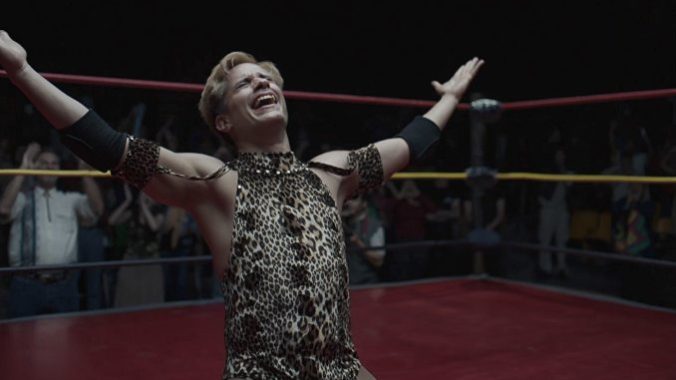Gael García Bernal Casts a Spell in Queer Wrestling Biopic Cassandro

In a dark stadium, an empty alleyway, a trashed and red-washed hotel room, a slight wrestler feels the weight of the odds stacked against him. Whether it’s homophobia, abandonment or grief, his approach remains the same: Use his opponent as a ladder. The crueler they are, the higher he goes, buoyed by the sheer determination that his own star will shine so brightly that others may as well revel in his light. If he believes in his own freedom fiercely enough, maybe everyone else will, too. In Roger Ross Williams’ triumphant narrative feature debut Cassandro, such a star rises in the shape of certified charmer Gael García Bernal playing Saúl Armendáriz, better known as real-life luchador Cassandro, the exótico who first toppled the hierarchy of heterosexuality in 1980s lucha libre wrestling.
The film picks up at the beginnings of Saúl’s journey to stardom. He’s the spry but mousy El Topo, a masked luchador who’s been fighting in tiny Juárez venues for a few years and just can’t convince any of his fellow, much larger wrestlers to take him seriously. It’s not that Saúl harbors too many illusions about himself or his prowess; it’s just that he wants to give the audience a show. He longs for the visual poetry he sees in other matches—especially in the performances of the collectively-despised exóticos, unmasked feminine and gay-coded male wrestlers who exist to antagonize the crowd. Here, director of photography Matías Penachino first begins to create the ring as a space of fantasy, slowly panning across the venue as Saúl watches the flamboyant, lyrical performance of an exótico swishing his long skirt and throwing his match. This bright, hypnotic spotlight is where Saúl wants to be, but he has no desire to constantly, bold-facedly lose.
Back in El Paso, Saúl lives quietly as the only son to his heartbroken but devoted single mother (a naturalistic, expressive Perla de la Rosa). Their relationship is complicated and realistic; she encourages that one day he’ll find a good boy that he can take care of, but pines after Saúl’s missing father and resents her son’s ostentatiousness for driving him away. Through flashbacks, his young and wide-eyed self clings to his father, a gruff, faceless man who introduced him to the magic of luchadores but whose love of Jesus prohibited him from accepting his son. This same piousness doesn’t stop him from having an extramarital affair with Saúl’s mother, but Saúl doesn’t dwell on that, instead supporting his mother as best he can while refusing to stuff himself back into the closet.
As it turns out, repackaging this childhood sadness is Saúl’s superpower. Instead of discarding wrestling or his queerness, he starts to ascend by shedding the macho stature of the typical protagonist luchador and leaning into a performance of sly, wily limp-wristedness. In a particularly successful costume and narrative choice, Saúl transforms one of his mother’s more audacious leopard-print blouses into his superhero armor, sewing and stoning it until he’s time-traveling to his mother’s past as the other woman. When he steps into the ring as Cassandro, made-up and lycra-ed to high heavens, he’s an impervious version of her, encouraging the crowd’s booing and quickly winning them over with an exuberant and winking stage presence. As Cassandro flips into increasingly compromising and salacious positions, all with a cool nonchalance and shit-eating grin, the audience starts to rally behind him, and the promoters in the crowd take notice.
-

-

-

-

-

-

-

-

-

-

-

-

-

-

-

-

-

-

-

-

-

-

-

-

-

-

-

-

-

-

-

-

-

-

-

-

-

-

-

-








































